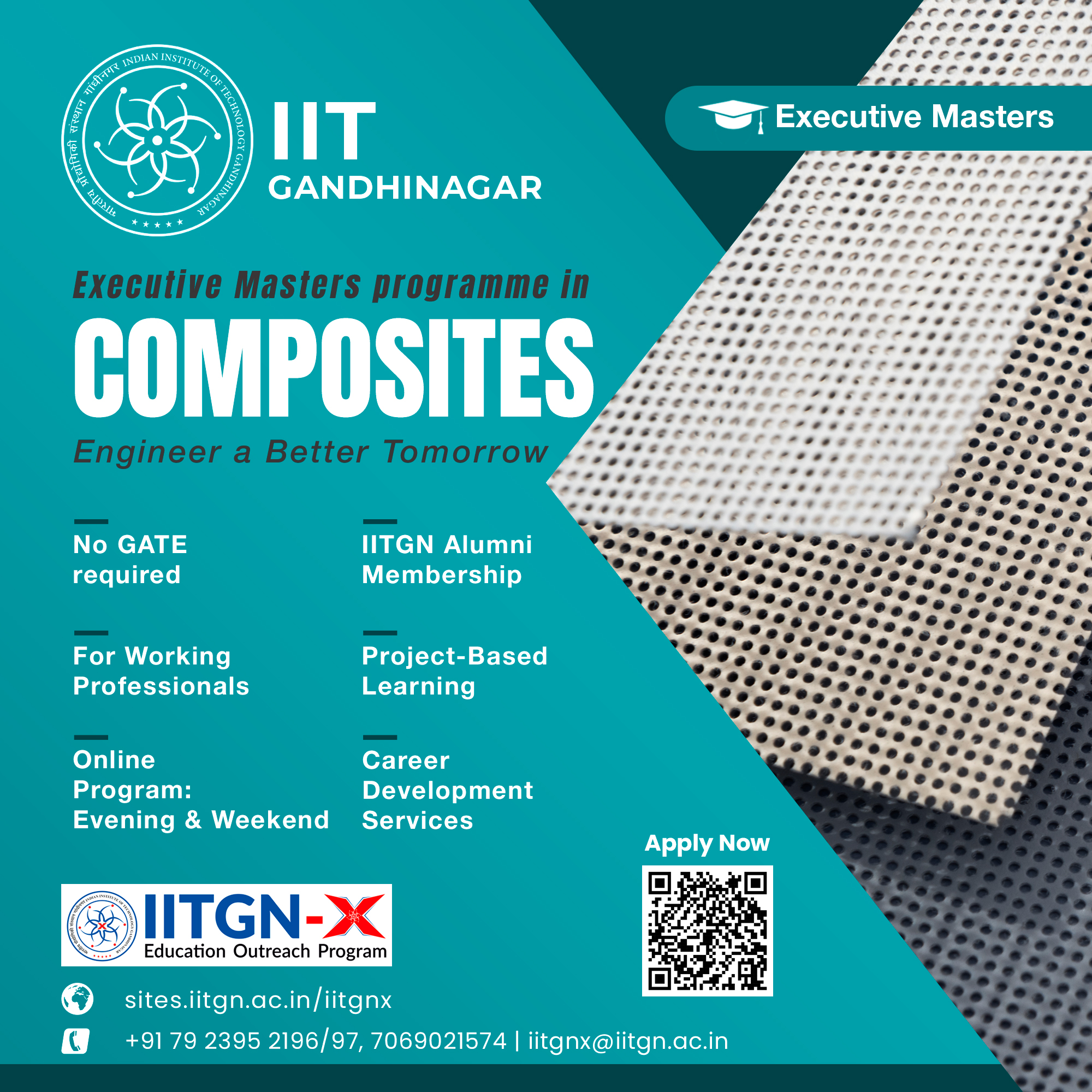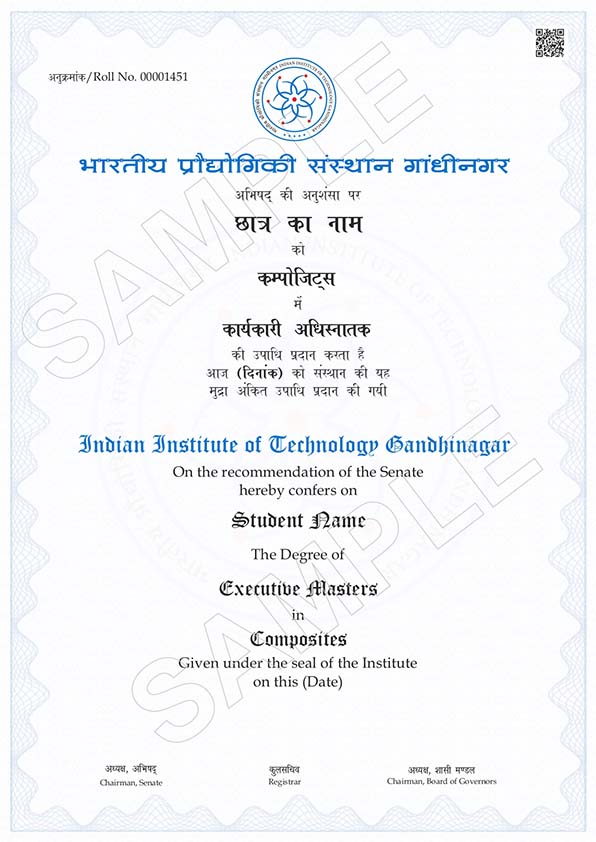Executive Masters in
Composites
Engineer a Better Tomorrow

Executive Masters in Composites
“Engineer a Better Tomorrow”
The Indian composites industry has an approximate footprint of $2 billion, accounting for a mere 1% of the global market share, indicating significant growth potential. To develop a skilled workforce capable of meeting the increasing demands of the Indian industry, IIT Gandhinagar offers a unique and flexible Executive Masters program in Composites. This program is industry-focused, tailored specially for working professionals aiming to deepen their expertise in composite materials. The Executive Masters in Composites is developed in collaboration with industry leaders with an emphasis on providing foundational understanding alongside state-of-the-art insights into composite design, manufacturing, and applications across industries such as aerospace, automotive, construction, and renewable energy. The program empowers participants to drive innovation in composites and take on leadership roles in their respective fields. It emphasises practical learning, enabling students to participate in hands-on projects that reflect real-world challenges in composite engineering. The goal is to nurture students to innovate by forging strong collaborations with industry experts and understanding the critical challenges in the domain. Beyond the tenured faculty at lITGN, participants will have the opportunity to learn from international experts who specialise in advanced composite materials, manufacturing technologies, and industry innovations.
Eligibility
- Bachelor’s degree in Aerospace, Applied Mechanics, Nuclear, Automobile, Mechanical, Civil, Naval, Aeronautical, Material Science, Textile, or related disciplines with at least 60% marks (or a 6.0/10 CPI).
- No GATE qualification is required.
Program structure
The Executive Masters degree program structure is as below:
Program Duration: 2 years
Number of Credits: 58 credits
Modules: There are six modules in the program.
Module Duration: Each module lasts for 12-14 weeks.
The course components breakup typically represents:

| Module | Course type and Numbers | Total number of courses | Credits |
| 1 |
1-Foundation 1-Core |
2 | 8 |
| 2 |
1-Foundation 1-Core 1-HSS |
3 | 10 |
| 3 |
2-Core 1-HSS |
3 | 10 |
| 4 | 2-Core | 2 | 8 |
| 5 |
2-Core 1-Project |
3 |
10 |
| 6 |
3-Core 1-Project |
4 | 12 |
| Total | 17 | 58 |
Program fee
Application fee ₹1000 (to be paid during application submission)
Fee structure for candidates enrolling in the program.
| Details | Amount (in INR) |
|
Registration Fee To be paid within 2 weeks of the selection. |
₹1,20,000 |
|
Tuition Fee To be paid at the beginning of every module (Will be notified on the website) Module 1: 80,000 |
₹5,80,000 |
| Total Fees | ₹7,00,000 |
Education loan avail from leading banks and NBFCs
Important Dates
For further information, you may email us at iitgnx@iitgn.ac.in, admission@iitgn.ac.in.
Contact us + 91 79 2395 2196/97, 7069021574
A meticulously developed curriculum, crafted by the subject matter experts from IIT Gandhinagar to understand the composite materials, encompassing their properties, manufacturing processes, and applications in various industries. This curriculum seamlessly integrates in-depth theoretical knowledge with extensive practical application to nurture expertise effectively.
Introduction to Composite Materials
Mathematical Methods for Engineers
Mechanics of Composite Materials
Manufacturing Processes for Composites
Writing
Design and Analysis of Composite Structures
Testing & Design Validation of Composite Materials
Leadership
Advanced Composite Materials
Advanced Composite Analysis: Impact & Crashworthiness
Finite Element Analysis of Composites OR
Process Modelling for Composite Manufacturing
Quality Assurance and Inspection of Composites
Project-I
Tool Design for Composites
Perspectives on the Composites Industry
Project-II
For the detailed Curriculum, please write an email to iitgnx@iitgn.ac.in
Learning Format
- Live Interactive Online Sessions
- Accessible Recorded Lectures (For Revision and Missed Classes)
- Learn from industry leaders and domain experts through exclusive guest sessions.
- Weekend/Evening classes to accommodate professional commitments.
- Continuous assessments through quizzes, assignments, and exams.
- Optional on-campus experience at IIT Gandhinagar for immersive learning.
